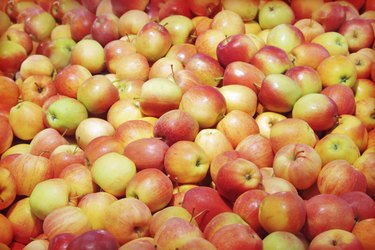
An apple a day may not keep any physicians at bay, but apples are very nutritious. They are high in fiber, important for digestive health, and boron, which promotes bone growth. Apples are also rich sources of phytochemicals, an anti-oxidant found in plants, fruits and vegetables. They also deliver a healthy dose of vitamin C.
Content
Video of the Day
One apple provides roughly 10 percent of your daily recommended allowance for vitamin C. A raw apple, weighing 138 grams with skin, provides 6.3 milligrams of vitamin C, or ascorbic acid, but not all apples provide the same amount of vitamin C. Scientists realized this as early as 1938, as demonstrated in an Ulster Medical Journal entry written by Robert Hadden. In this paper, Dr. Hadden passionately argued a colleague's charge that apples were an excellent source of vitamin C with the statement, "Apples are not commonly credited with a very significant vitamin C content." Dr. Hadden further breaks down the vitamin C content of popular apples of the day including Jonathon, King Edward and Baldwin apples.
Video of the Day
Oxidative Browning
When you cut an apple, enzymes cause oxidative browning. This browning results in vitamin C loss in the apple. You can prevent this unsightly discoloration during preservation by adding vitamin C in the chemical form of ascorbic acid. Dip apple slices in a solution of water and crushed vitamin C pills to retard browning and ascorbic acid loss.
Benefits
Eat the apple peel, as it contains a significant portion of vitamin C within the apple. Vitamin C is a water-soluble vitamin. Vitamin C is important in the development of collagen in your bones, muscles, cartilage and blood vessels. Ascorbic acid also aids in the digestion of iron. Scientists disagree on the effectiveness of using vitamin C to fight colds, and some state that it will only help prevent and treat a cold if you have low levels of the vitamin to begin with, according to MedlinePlus.com. Vitamin C is widely used in the treatment of scurvy, but physicians would use prepared forms of ascorbic acid over the consumption of apples.
Risks
There is no known risk for gaining vitamin C by consuming apples, as the amounts of vitamins contained in food are relatively low. Consume your daily recommended amount of vitamin C through the food you eat to avoid the adverse health effects caused by high doses of vitamin C, including kidney stones, diarrhea, gastritis and nausea. You can also avoid side effects sometimes experienced by those taking vitamin C supplements. These side effects include nausea, vomiting, heartburn, abdominal cramps and headaches.